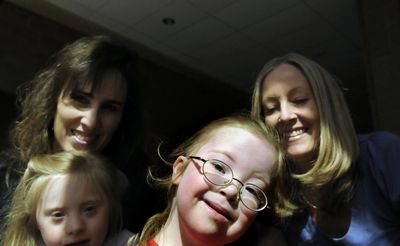Area mothers establish support group for Down syndrome-affected families

“We’re here to connect the dots and provide answers to the ‘what’s next?’ question that immediately comes to mind after being given a Down syndrome diagnosis,” Susan Villelli said.
Villelli and Cheryl Roberts, both mothers of children with Down syndrome, are cofounders of a new group, Down Syndrome Connections, or DS Connections for short.
Hayden Lake resident Villelli, and Coeur d’Alene resident Roberts, envision a world in which all people with Down syndrome have the opportunity to enhance their quality of life, realize their life aspirations, and become valued members of welcoming communities.
“We want to create a family-friendly monthly meeting where family and friends of people with a DS diagnosis can connect,” Villelli said.
Each month, the mothers hope to exchange information on professional resources, share real-life experiences, and simply connect DS families and friends with each other.
“Until now, there has not been a supportive group of this type in either Spokane or Coeur d’Alene,” Villelli said. According to the National Down Syndrome Society Web site, Down syndrome is the most commonly identified cause of cognitive impairment, and it occurs in about one in 733 births in the United States.
Down syndrome occurs when an individual has three, rather than two, copies of chromosome 21 – an additional genetic material that alters the course of fetus development. Researchers are making great strides in identifying the genes on chromosome 21 that cause the characteristics associated with Down syndrome.
Quality educational programs, a stimulating home environment, good health care, and positive support from family, friends and the community enable people with Down syndrome to develop their full potential and lead fulfilling lives, according to the Web site.
“Many feel strongly that it will be possible to improve, correct or prevent many of the problems associated with the condition in the future,” Villelli said.
Villelli and Roberts met in December 2005, immediately making a connection. Villelli had the public relations and marketing experience, while Roberts had the contacts. Villelli decided to start DS Connections and invited Roberts to join her.
DS Connections had 14 mothers and fathers, plus four grandparents and two therapists from Idaho and Washington attend their first meeting.
DS Connections meets the third Saturday of each month from 1:30 to 3 p.m. at American Universal Storage’s conference room, just west of Atlas Road on Prairie Avenue in Hayden, Idaho.
A message that is echoed loud and clear, from both mothers, is that the positive impacts of having a family member with Down syndrome far outweigh the difficulties or challenges.
Villelli and Roberts both have other children and a question they frequently encounter is: How does a sibling with Down syndrome affect their other children?
According to them, siblings of individuals with Down syndrome are very much aware of their sibling’s challenges and often take pride in their accomplishments. Plus, they are very loyal and do their best to protect and teach them.
“The majority of families share that they are stronger and closer as a result of the experience of dealing with a disability,” Roberts said.
“All parents have difficult moments and all parents face parenting challenges; however, parents of a child with a DS diagnosis face similar challenges unique to the diagnosis,” Villelli said.
Both women believe strongly it helps to share information and talk to others facing similar challenges with children who have Down syndrome.
“Our hope is that by sharing our experiences it might help someone else dealing with a similar challenge and that Down Syndrome Connections will improve the lives of people dealing with Down syndrome and their families,” says Roberts said.